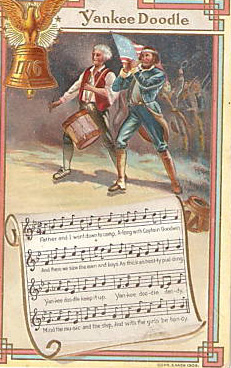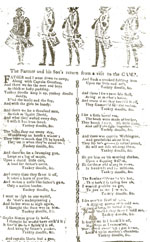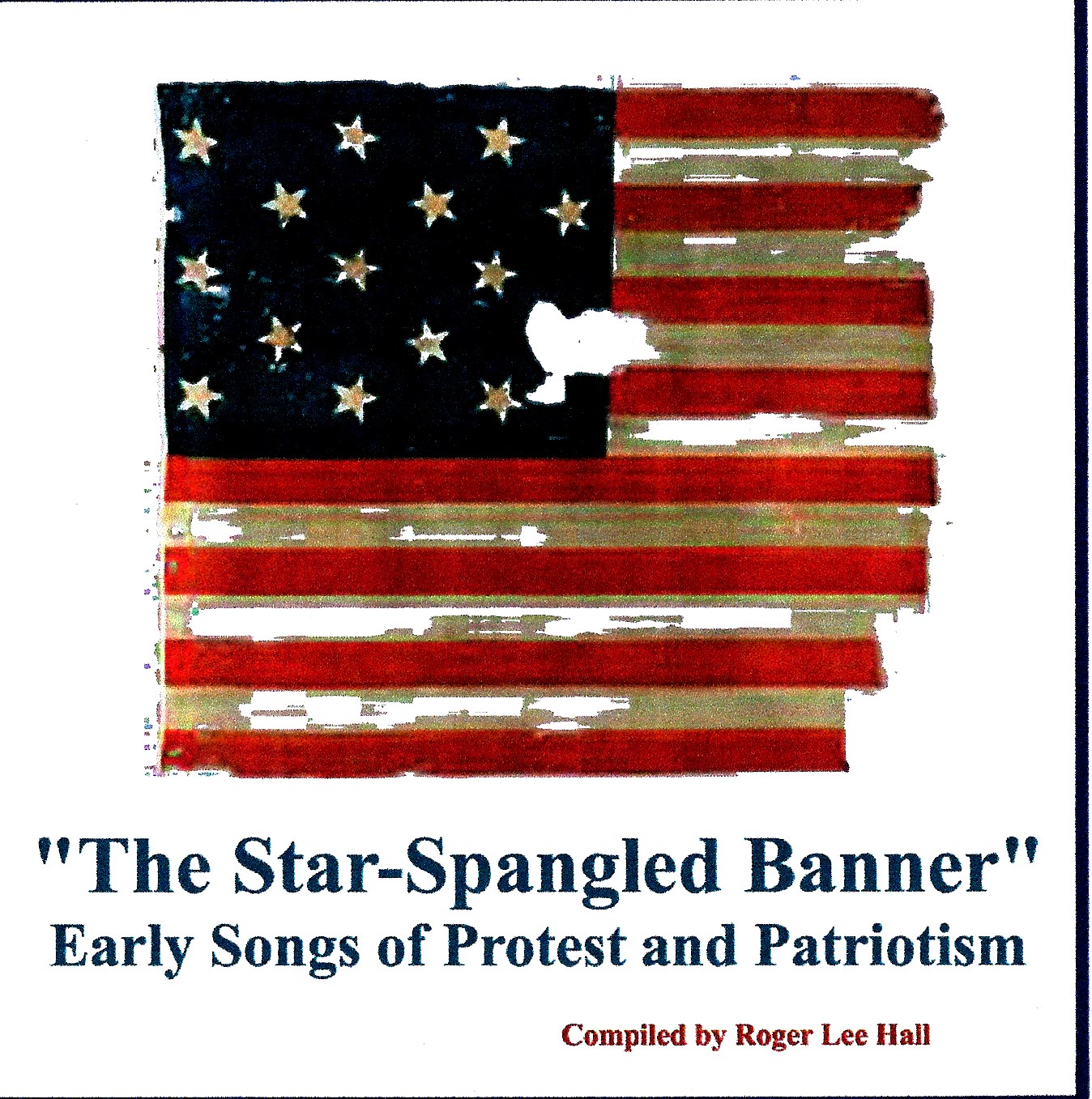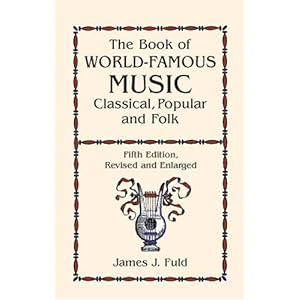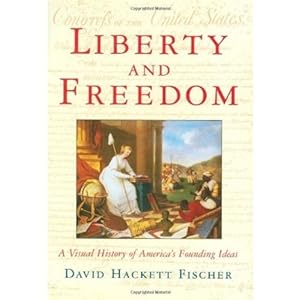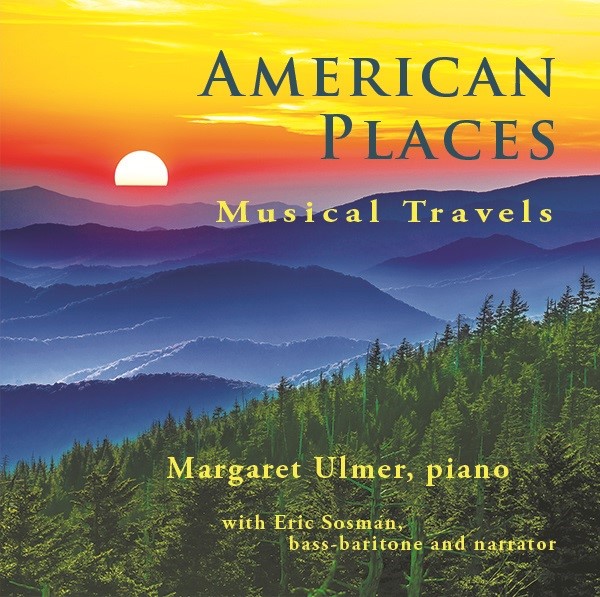
New England Song Series No. 6:
"Father And I Went Down To Camp"
The Boston Yankee Doodle Ballad
This ballad is sometimes confused with "The Yankee Doodle Boy" -- known by its opening line: "I'm a Yankee Doodle dandy," written by George M. Cohan in 1904 and made famous by James Cagney singing it in the Warner Bros. musical, YANKEE DOODLE DANDY (1942). But that is a different song.
The song which came first is shrouded in mystery as to when it was written.
But the author of the words has been identified.Read on...
The Boston Ballad
Father and I went down to camp,
Along with Captain Gooding,
And there we see the men and boys
As thick as hasty pudding.Chorus:
Yankey doodle keep it up,
Yankey doodle dandy;
Mind the music and the step,
And with the girls be handy.
These opening words are the beginning of the earliest known version of the patriotic song written during the American Revolution.The song known as "Yankee Doodle" has been shrouded in legends for several centuries and it is difficult to determine which versions are authentic.
Perhaps the most common legend is that Dr. Richard Shuckburgh wrote a ballad set to the "Yankee Doodle" tune to poke fun at New Englanders who served in the French and Indian War in Canada. It has been claimed that Shuckburgh included this verse:
With his commission he had got,
He proved an errand coward,
He dared not go to Cape Breton,
For fear he'd be devoured.
Obviously verses like that didn't please the New Englanders, or "Yankees," as they were called. Part of the legend is that Shuckburgh wrote his mocking ballad in 1755 or 1758 while a guest at the Van Rensselaer brick manor also known as Fort Crailo, near Albany, New York.
As mentioned in David Hackett Fischer's extensive discussion on "Yankee Doodle" in Liberty and Freedom, there are conflicting documents that support this claim though he assumes that Dr. Shuckburgh wrote it. But which version of the ballad did he write?Are there any documents that can prove that "Yankee Doodle" was written down?
Yes, there are several.
One of these documents is sheet music published in London,
titled: "YANKEE DOODLE, or (as now christened by the Saints of New England), THE LEXINGTON MARCH."This is undated but must have been printed after the battles at Lexington and Concord in 1775. This version was meant to ricicule the "Yankees" and were not for sensitive eyes (you are warned!).
Here are the first and sixth verses:Brother Ephraim sold his Cow and bought him a Commission,
And then he went to Canada to Fight for the Nation;
But when Ephraim he came home he prov'd an arrant Coward,
He wouldn't fight the Frenchmen there for fear of being devour 'd.Seth's Mother went to Lynn to buy a pair of Breeches,
The first time Nathan put them on, He tore out all the Stiches;
Dolly Bushel let a Fart, Jenny Jones she found it,
Ambrose carried it to Mill where Doctor Warren ground it.But the most important document is a broadside sheet probably printed in or near Boston with fifteen verses.
In his fascinating though flawed book, America's Song: The Story of 'Yankee Doodle,' Stuart Murray mistakenly claims this Boston version of "Yankee Doodle" as being written by Dr. Shuckburgh. That is incorrect. This Boston ballad has this heading:
The Farmer and his Son's
return from a visit to the CAMPIn her excellent book, Music for Patriots, Politicians and Presidents (1975),
Vera Brodsky Lawrence wrote this about the ballad:Attributed to Edward Bangs. a sophomore at Harvard who had served at Lexington as a minuteman, these words --with slight variations -- were often reprinted during the later eighteenth and early nineteenth centuries. The broadside, probably dating from 1775 or 1776, is the earliest known printing of this version.
Here are five of the fifteen verses of this ballad:
Father and I went down to camp,
Along with Captain Gooding,
And there we see the men and boys
As thick as hasty pudding.Chorus:
Yankey doodle keep it up,
Yankey doodle dandy,
Mind the music and the step,
And with the girls be handy.And there we see a thousand men,
As rich as 'squire David,
And what they wasted every day,
I wish it had been saved.Chorus:
Yankee doodle etc.And there was Captain Washington,
And gentle folks about him,
They say he's grown so tarnal proud,
He will not ride without them.Chorus:
Yankee doodle etc.And there we see a swamping gun,
Large as a log of maple,
Upon a deucid little cart,
A load for father's cattle.Chorus:
Yankee doodle etc.And every time they shoot it off,
It takes a horn of powder,
And makes a noise like father's gun,
Only a nation louder.Chorus:
Yankee doodle etc.
macaroni.
According to James J. Fuld's The Book of World Famous Music, the earliest known printing of the best known words to "Yankee Doodle" relating to "pony," "feather in his cap," and "macaroni" are in James Orchard Halliwell's, The Nursery Rhymes of England (London, 1842). So that is NOT the original text.
Fuld also wrote:
Most of the authorities now conclude that the song is American in origin. The tune for "Yankey (or Yankee) Doodle" was known in America from the 1760s onward.
But it wasn't until the Edward Bangs version from 1775-76 that this most famous of early American songs became well known.
By the mid-19th century, this ballad was printed in Father Kemp's Old Folks
Concert Tunes as "Yankee's Return From Camp (Yankee Doodle Dandy)" and the chorus was slightly different:Yankee doodle keep it up,
Yankee doodle dandy,
Beneath the fig tree and the vine,
Sing Yankee doodle dandy.That was the cleaned-up version. Though it may not be the best known version today, the Boston Yankee Doodle ballad, attributed to Edward Bangs, was the best known version during the American Revolution.
And the chorus ends with these suggestive lines:
Mind the music and the step
And with the girls be handy.Edward Bangs (1758-1818), as a young sophomore at Harvard College, was having some fun as a frisky young lad presumably "handy" or wishing he was that way with the girls.
One day, over two hundred years ago, he wrote a simple ballad about a farmer and his son as they "went down to camp" which it was printed on a broadside sheet.
Now Edward Bangs and his ballad are part of American musical history.
-- Roger Hall, music preservationist
The Recordings
Hear a recording of the Edward Bangs "Yankee Doodle" song as arranged by William A. Fisher, and performed The Old Stoughton Musical Society Chorus, conducted by Earl Eyrich.
To listen to this version of "Yankee Doodle" -- click here
This arrangement is included on these AMRC CDs:
"The Star-Spangled Baneer"
Early Songs of protest and Patriotism
(AMRC 0045)
The References
The Book of World-Famous Music: Classical, Popular, and Folk
(Fifth Edition, Revised and Enlarged) (Paperback, 2000)
By James J. Fuld
Music For Patriots, Politicians, and Presidents:
Harmonies and Discords of the First Hundred Years (Hardcover, 1975)
By Vera Brodsky Lawrence
AMERICA'S SONG:
The Story of 'Yankee Doodle' (Hardcover, 1999)
by Stuart Murray
Help support the educational mission of the
Center for American Music Preservation
Order this limited edition CD which opens
with an arrangement of "Yankee Doodle" by Benjamin Carrr
See also the collections available at the

© 2010 (Updated: 2025) PineTree Productions. All Rights Reserved. Contact: pinetreepro@aol.com





